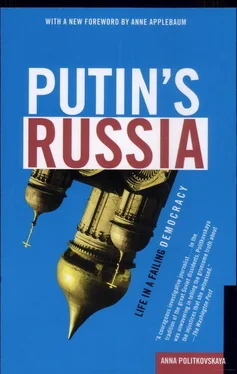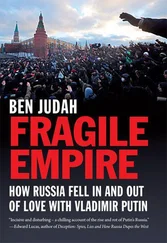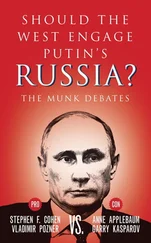The Russian code of criminal procedure provides that the accused have access to an attorney irrespective of ability to pay. During the second Chechen war, however, the law-enforcement agencies began misusing the system to foist on accused persons defense lawyers who, more often than not, were the agencies’ former employees. Such people are known as insider lawyers. There are also lawyers who work with the FSB and so have a better understanding of its needs than of the individuals they are supposed to be defending. The function of such lawyers is to be present on occasions when the law requires the presence of an attorney. FSB officers also appoint insider lawyers to represent suspects the FSB has abducted. The relatives know only that their family member has disappeared. The FSB deliberately hides him, informing the family neither of his whereabouts nor of the charges against him. Often no formal accusation is ever made. The detention of the disappeared person is illegal, but the family is prevented from appointing a defense lawyer for him. Such victims can “disappear” for weeks or months; in Hasuhanov’s case, the period was about six months. Meanwhile, testimony is beaten out of them, as happened in Hasuhanov’s case. His family had no idea what had happened to him or where he was. All the law-enforcement and security agencies of the republic denied they were detaining anybody by that name, while in fact he was being tortured by the FSB despite the appointment of a lawyer.
The Red Cross is often unable to carry out its functions because the Russian authorities frequently withhold permission for prison visits.
Abdullah Hamzaev died in Moscow in June 2004 after a serious illness. During the Budanov trial he was subjected to extreme pressure for speaking out against the accused and all he stood for. Hamzaev was threatened with retribution, and members of his family were intimidated both by Russian nationalists from extremist paramilitary groups and by officers who were colleagues of Budanov. He had several heart attacks in the course of the trial and was taken to the hospital. Once he suffered infarction and clinically died, but later returned to the trial. Hamzaev succeeded in ensuring that Budanov was sentenced to a long term of imprisonment, something few people believed possible in the spring of 2000.
It is important to understand what changed the direction the judicial proceedings were taking, toward justice in accordance with the law. Psychological and psychiatric reports were crucial in the Budanov case. When it became apparent that Budanov might be released from detention right there in the courtroom, the Memorial Civil Rights Center and the director of the Independent Psychiatric Association of Russia, Professor Yury Savenko, sent a request to colleagues in Germany to produce a report for the trial based on the documentary evidence. Simultaneously, lawyers stated in court that they had no confidence in the politically motivated Russian psychiatric experts and demanded that respected foreign psychiatrists be officially invited to contribute to the trial. Despite the fact that the judge refused this demand, the German psychiatrists soon presented their conclusions, which were passed to members of the Bundestag. As a result, the spotlight turned onto the biased reports of the Russian psychiatrists, which were contrasted with the German specialists’ conclusions. Then Gerhard Schröder brought up the case in conversation with Putin, who, while not much concerned about public opinion in his own country, is highly sensitive to criticism from abroad. Shortly afterward, the trial in Rostov-on-Don dramatically changed direction, which only goes to show, once again, the dependence of the courts on Russia’s leaders. The state prosecutor who had spoken in favor of Budanov was replaced by one who was unbiased. Lawyers were allowed to call witnesses. The judge agreed to attach to the case file the long report by Dr. Stuart Turner, a fellow of the Royal College of Psychiatrists, in London. For Dr. Turner, Yury Budanov was not the politically sensitive figure he was for us; he was just another patient. Thus it was Western intervention that changed the direction of the Budanov trial.
Rushailo was removed from this post in May 2004, and moved into a new position with little power.
In addition to the pedophilia problem, the prosecutor general’s office also held an inquiry into the allegation that Fedulev’s wife had given a bribe of $20,000 to Judge Krizsky, and into the closing of the case for which he had interceded. The inquiry found the allegation of “thanking” to be valid, but no criminal investigation followed. In accordance with Russian tradition, Krizsky was allowed to “resign at his own request” in order not to cause a scandal. And resign he did, into “honorable retirement” from the bench. Soon afterward, Prosecutor General Skuratov left office, having provoked a public scandal in which corruption figured prominently.
This was moral blackmail calculated to crush a woman in a state of extreme stress. Under Russian legislation, as the investigator must have known, exhumation can be authorized only after a court hearing. Where exhumation is authorized, it may take place only in the presence of the mother, father, or other close relatives whom the court recognizes as having suffered as a result of the death of the individual concerned. As a result of his misconduct, the investigator who attempted to blackmail Irina was moved to other work. Later he was quietly sacked.
“Telephone law” is the Soviet term for an informal system of governance based on personal acquaintance. Officials telephone judges directly, and the latter produce the verdicts required. “Telephone law” operates in every other sphere of our life as well, as is evident from the saying “What can’t be done, can be done over the telephone.”
An inquiry into the arrest of Aelita Shidaeva was conducted by the Moscow prosecutor’s office after she lodged a complaint. None of the police officers involved were disciplined.
A wave of racism (not only against Chechens but against people of non-Slavic appearance) washed over Russia after the Nord-Ost events. Many complaints were investigated by Russian civil-rights organizations, primarily the Moscow Helsinki Group, the Memorial Civil Rights Center, and the Citizen’s Aid Committee for Assistance to Refugees. Numerous petitions and appeals were sent to the president by Amnesty International and Human Rights Watch. They were fruitless. Nobody was punished. The international interventions did not halt the wave of racism largely because the Russian leadership took no action. Racist harassment and murders continue and show no sign of abating.





![Stephan Orth - Behind Putin's Curtain - Friendships and Misadventures Inside Russia [aka Couchsurfing in Russia]](/books/415210/stephan-orth-behind-putin-s-curtain-friendships-a-thumb.webp)






